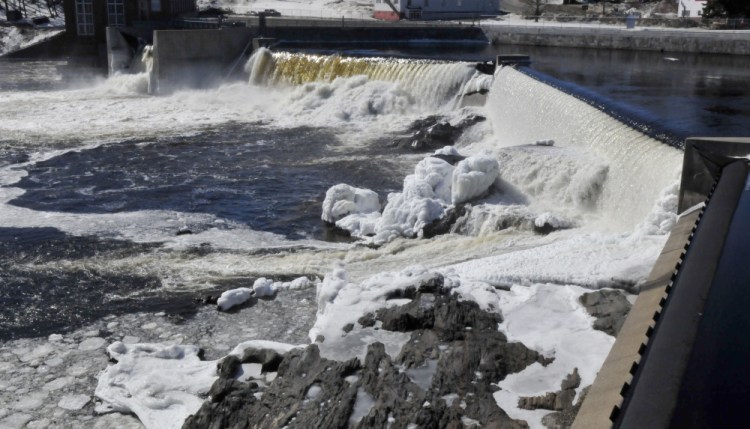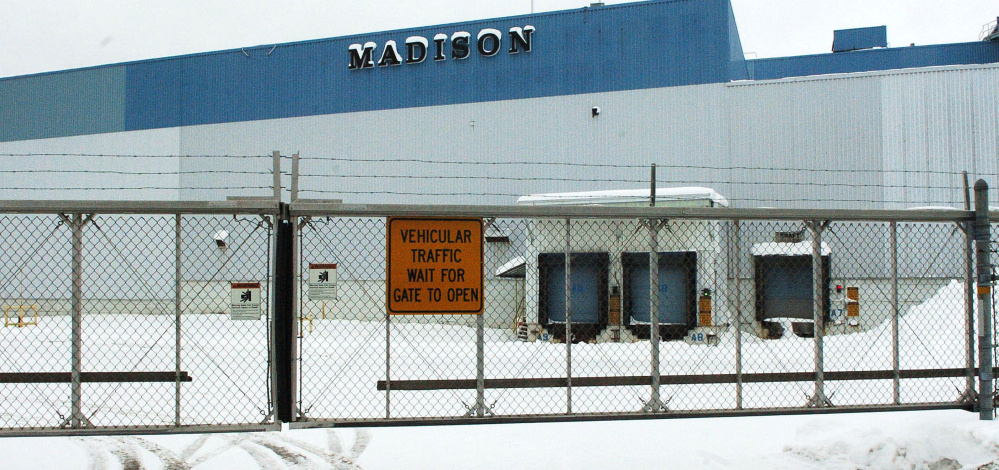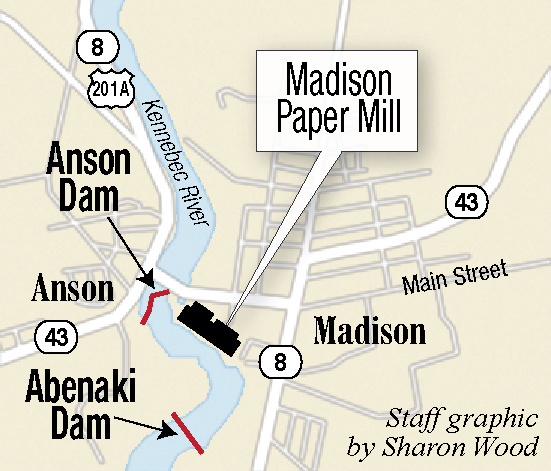MADISON — Local officials are actively courting Poland Spring in a bid to bring economic life back to the shuttered Madison Paper mill property, an early sign that there could be new prospects for jobs and investment there.
But while there are potential tenants for the former Madison Paper Co. mill facility, officials are waiting for the sale of the mill’s former hydroelectric power station before any real action can take place.
The Madison mill acquisition — which closed Jan. 3 for an undisclosed price — includes the real estate of the main paper mill site as well as all mill equipment. The mill’s hydropower assets are being marketed separate from the mill transaction. There are bidders for the hydro assets, officials say.
Poland Spring is seeking a new site in western Maine for a $50 million water bottling plant and access to at least two additional springs that would boost the company’s production capacity by nearly 45 percent, the Portland Press Herald reported last month.
Poland Spring has not actually bid on the hydro assets, but Madison area officials are making the pitch.
“I guess it’s no secret that we’ve been trying to respond to the Poland Spring article that they had in the paper that they were looking for another place,” Madison Town Manager Tim Curtis said. “We have spots along the river here that have pretty strong aquifers in them. We’d like to see if Poland Spring would be interested in doing some testing here to see if they can find a water source that works for them.”
Poland Spring, part of Swiss-based Nestle S.A., already operates three Maine bottling plants in Poland, Kingfield and Hollis. The planned new water sources and bottling operation would increase the company’s production capacity from about 900 million gallons last year to 1.3 billion gallons.
They also would create up to 80 new jobs in rural Maine, where mill closures, such as Madison’s last year, have left former employees scrambling for new jobs, retirement or training in new skills.
Meanwhile, the Kennebec Somerset Transition Team at Kennebec Valley Community Action Program reports that 63 percent of the 200-plus workers who lost their jobs when the mill closed in May have landed on their feet in retirement, in other jobs or in training programs.
Curtis said the transition team led by Dana Hamilton has held several meetings over the past year at the mill with state and federal representatives talking about job fairs, computer skills, mock interviews and resume training
“A lot of the initial push was to get guys ready that hadn’t interviewed for a job in 25 years,” Curtis said of the laid-off workforce at the mill. The average age of the workers was about 50 and most of the younger, entry-level employees found work at Poland Springs, the Sappi paper mill in Skowhegan and Huhtamaki packaging in Waterville.
According to the minutes of a recent transition team meeting, 18 former employees have taken retirement with a pension paid by former mill owners UPM-Kymmene Inc. Curtis said the recent announcement by Sappi that the company is retooling one of its paper machines is good news for former Madison workers.
Gregory Schain at New Mill Capital Holdings in New York City, whose company in a joint venture with other entities purchased the Madison mill, said he is confident that they will find a business to move into the former paper-making facility, but that work hinges on the sale of the hydro plant.
“I actually have several businesses that have expressed serious interest in operating at the site, but sourcing power is key, and everyone is in a holding pattern until the hydro sells,” Schain said. “The most obvious sources of power are the hydro or putting in a power generating station using the existing gas line that was installed in 2014. Until the hydro sells and people can explore the cost of that option, we are at a standstill as it relates to reusing the real estate. Hopefully UPM makes a decision soon so we can move forward, and hopefully whoever buys the hydro prioritizes local job creation.”
As Madison officials look to court Poland Spring to the hydro and mill sites, the water company is officially staying mum on whether the Somerset County location is being considered.
Heather Printup, community relations manager for Poland Spring Bottling, said Monday in a company statement that as consumer demand for Poland Spring water continues to grow, “we are actively exploring our options to sustainably meet that demand through expansion and increased investment in Maine.”
That expansion, she said, includes identifying additional spring sources and potentially a new bottling facility at a location yet to be determined. The focus, Printup said, is primarily in Western Maine and more recently in the Penobscot River Valley.
Mark Dubois, geologist and natural resources manager for Poland Spring, was in legislative hearings Monday and was not available for comment.
In Madison, Curtis said if Poland Spring can find a water source that works for them, maybe the new owners of the paper mill and Madison and Somerset County officials can work something out with the industrial site that could host a bottling plant.
He said there is a top bidder for the hydro property, but so far no one has disclosed who that is and that information may not be available until April or May.
Curtis said that the top bidder would buy the hydro assets in Madison and in Anson along with all the water rights along the Kennebec River. There are two hydro-electric dams and power plants at the former Madison Paper site.
The dam at the upper mill is referred to as the Anson Dam. That power plant is in Anson and is assessed at approximately $20 million. Down the river at the lower mill is the Abnaki Dam, which is housed in Madison and valued at approximately $37 million, Curtis said. The Anson hydro facility generates 8 megawatts of power at peak and the Abnaki Dam about 18-20 megawatts, he said.
The owner of the hydro facilities would own land on both sides of the river with provisions that include establishing recreational sites, such as the Madison boat landing north of the former mill. The water rights include land along the river about a mile upstream to Weston Island and about a mile downstream toward Norridgewock.
Because of existing licensing agreements, whoever buys the hydro facilities also has to maintain trails and river access sites on both sides of the river, according to Curtis.
Heather Johnson, executive director at the Somerset Economic Development Corp., which is working with former mill owners and the town, said Monday it is too early to count the Madison mill site as a candidate for a Poland Spring option.
“They are looking for springs, and we requested that they consider our area in their consideration set,” Johnson said Monday. “They have a significant number of people making that same request, so it’s still in a data-gathering stage. We haven’t even sent them sites to review yet.”
Johnson said the development corporation doesn’t want to give the impression “that this is further along than it is.”
“It’s really early, and I think a large number of communities are doing the same thing. We don’t even know if we have a site that is appropriate for them at this point,” she said. “Obviously we’d love to have them if we can get them, but we are still gathering information ourselves.”
Curtis added that the owner of the Hartland Tannery is looking to move and the former Madison Paper could be an ideal location. He said the state is making efforts to keep them in Maine.
Doug Harlow — 612-2367
Twitter:@Doug_Harlow
Send questions/comments to the editors.







Comments are no longer available on this story